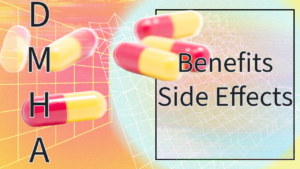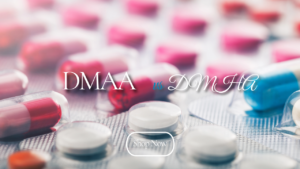With the rapid change in fitness and bodybuilding, Racer Ephedra offers a buying DMHA supplements guide. This guide provides knowledge on where to find and how to make an informed purchase of DMHA. Out of all the supplements available, DMHA has been gaining attention due to its potential benefits.
Its popularity comes from being a pre-workout supplement. Current marketing shows it as a safer alternative to the now banned substance DMAA. However, DMHA must still be approached with caution due to both the possible risks and benefits before incorporated into your fitness regimen.

What is DMHA and how does it work?
DMHA is a central nervous system stimulant structurally similar to amphetamines. It is generally believed to work by increasing the neurotransmitters dopamine and norepinephrine in the brain. These neurotransmitters are associated with increased energy levels, focus, and alertness.
When consumed as a pre-workout supplement, DMHA is thought to enhance exercise performance by:
- Boosting energy and reducing fatigue
- Improving mental focus and concentration
- Increasing thermogenesis (fat burning) and metabolism
With the understanding of the potential benefits, DMHA’s mechanism of action and long-term safety lack full understanding. Research is currently being conducted to better understand this supplement.
Buying DMHA Supplements (2-Aminoisoheptane HCL)

Choose from the best 2-Aminoisoheptane HCL (DMHA) fat burner and pre-workout products. These are DMHA’s energy boosting ingredient.
Safety concerns and dosage recommendations of DMHA
As stated earlier, caution must be taken when buying DMHA supplements and any others. While it is a safer alternative to DMAA, there are still potential risks.
The recommended dosage as DMHA varies depending on the person. It is recommended to start at a low dosage between a 25 and 50 mg and gradually increase only when needed. It is still very important to follow the manufacturer’s instructions and to not exceed the recommended dosage.
Furthermore, DMHA should not be combined with other stimulants or medications. If any are being used, consult a healthcare professional to decrease the risks of negative side effects.
The difference between DMHA and DMAA
DMHA and DMAA both have structural similarities and potential uses as pre-workout supplements. However, there are key differences between the two:
- Legal Status: In 2012, the FDA bans DMAA. Specifically, its safety and potential health risks increases legal challenges. Meanwhile, DMHA is currently legal in many countries including the United States. It is still important to check local regulations.
- Potency: When comparing to DMHA, DMAA is more potent and potentially more effective. However, this potency increase comes with a higher risk of adverse effects.
- Side Effects: Both compounds can cause side effects, including increased heart rate, blood pressure, and anxiety. With this in mind, DMAA has more severe side effects, such as cardiovascular issues and even death in some cases.
Overall, DMHA is considered a safer alternative to DMAA. It still carries potential risks, and its long-term safety has not been yet extensively studied.
More DMHA Reviews
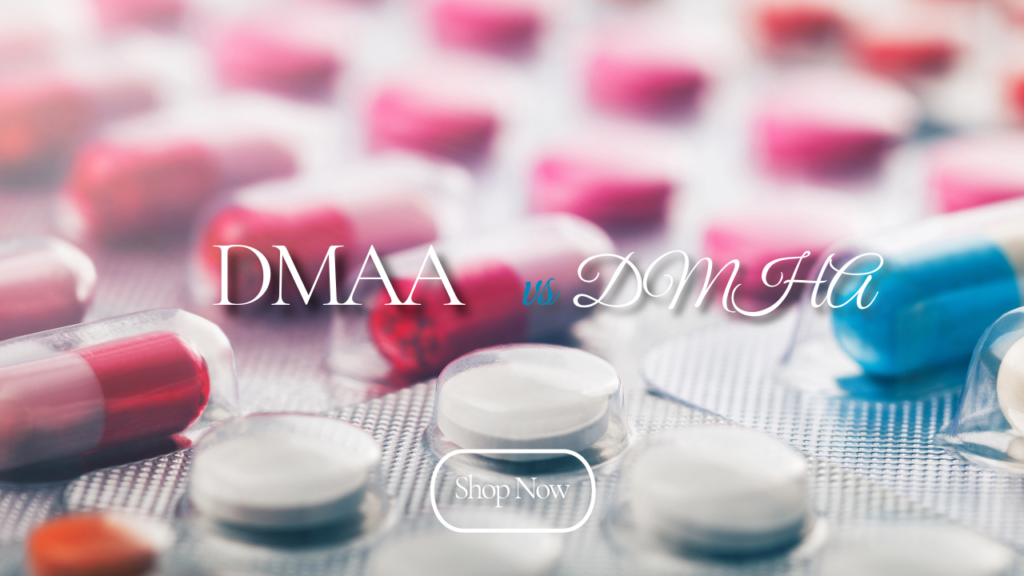
Read the full review on the differences between DMAA and DMHA. Understand why DMAA was banned and about the new compound found in high quality stimulant supplements.

What is stronger DMAA or DMHA? Understand the differences between dosage strength from the strongest stimulant based dietary supplements.
Where to Purchase DMHA Supplements
If you decide to incorporate DMHA into your fitness regime, it is crucial to purchase it from a reputable source. Listed before are options for buying DMHA supplements:
- Online Retailers: Many online supplement stores and marketplaces offer DMHA supplements.
- Racer Ephedra offers the most complete selection for DMHA products.
- The best and top rate fat burners and pre-workout supplements.
Before purchasing, it is essential to research and verify the reputation of sellers and manufacturers. Look for companies with a proven track record, positive reviews, and transparent labeling with ingredient lists.
Best DMHA Supplements

The most intense diet aid on the market. Hydroxyelite has become the top selling DMHA fat burner. From Hi Tech Pharma the top brand on the cutting-edge.

USP Labs best extreme diet aid. Oxyelite Pro is a DMHA fat burner that combines naturally occurring DMAA.
How to choose a reliable and reputable DMHA supplier
When it comes to purchasing DMHA supplements, choosing a reliable and reputable supplier is important. This ensures product quality, safety, and efficacy. Here are some factors to consider when selecting a DMHA supplier:
- Reputation and Reviews: Research the supplier’s reputation. Read customer reviews, check online forums, and look for any reports of complaints or issues.
- Transparency: A reputable supplier will be transparent about their manufacturing processes, ingredient sources, and third-party testing protocols.
- Quality Control: Look for suppliers that follow Good Manufacturing Practices (GMP) and have rigorous quality control measures to ensure product purity and consistency.
- Certifications: Suppliers with certifications from reputable organizations, such as NSF International or Informed Sport, provide additional assurance for product quality and safety.
- Customer Service: A reliable supplier is responsive and knowledgeable in addressing questions or concerns you may have.
- Legal Compliance: Ensure the supplier operates within the legal framework of your region. Additionally, they comply with all relevant regulations regarding the sale and distribution of DMHA supplements.
Considering these factors, you can increase your chances of finding a trustworthy DMHA supplier. You will also minimize the risks associated with purchasing potentially harmful or low-quality products.
Comparing the Different DMHA Products
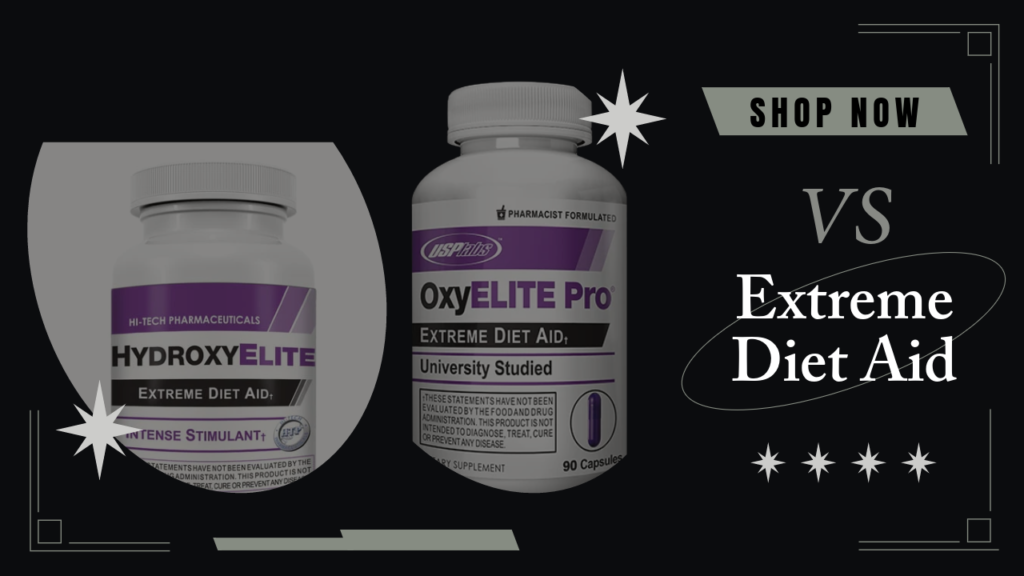
Hydroxyelite vs Oxyelite Pro – What are the key differences between the two best and most popular DMHA weight loss supplements?
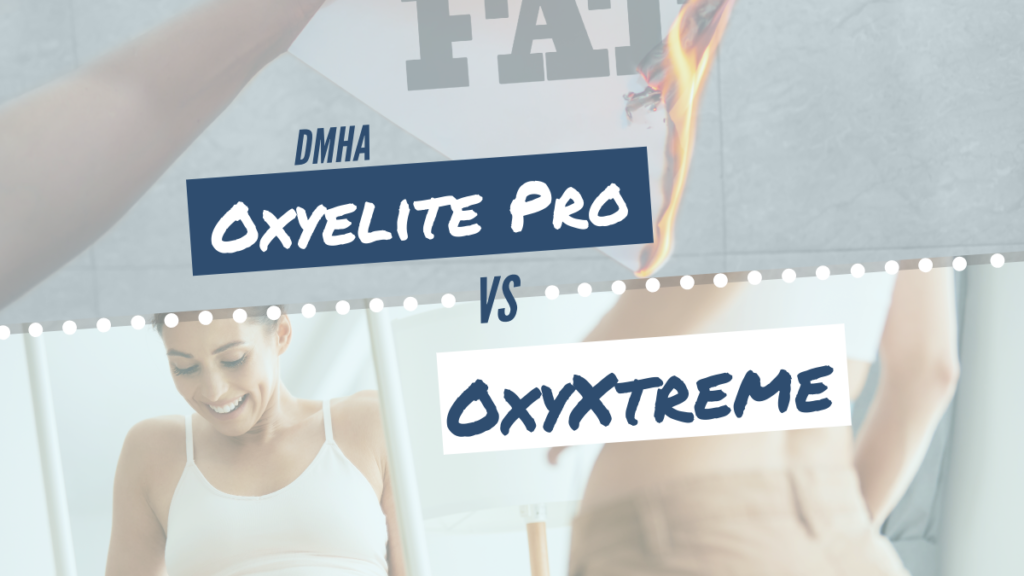
Oxyelite Pro vs Oxyxtreme – What makes these two DMHA supplements different? Intense diet aids vs mood pills.
The legal status of Buying DMHA Supplements
The legal status of DMHA varies across different regions and countries. In the United States, DMHA is currently legal and not explicitly banned by the FDA. However, it’s important to mention that the legal landscape around supplements can change. Therefore, you must stay informed about any updates or changes to regulations.
In some countries, buying DMHA supplements may be classified as a controlled or prohibited dietary supplement. It’s crucial to research and understand these specific laws and regulations in your region before purchasing DMHA supplements.
It’s also worth noting that while DMHA itself may be legal, some countries or regulatory bodies may have specific restrictions or bans. These are seen on products or brands containing DMHA. These restrictions are based on factors such as labeling, dosage, and the presence of additional ingredients.
If you plan on traveling with DMHA supplements, it’s advisable to research the legal status of your destination country to avoid any potential legal issues or complications.

Potential benefits and effects of DMHA on the body
While the long-term safety and efficacy of DMHA are not fully understood, several potential benefits have been associated with its use as a pre-workout supplement. Weight loss and fat burning are included. However, these effects are not guaranteed as individual responses may vary.
- Increased Energy and Endurance: DMHA provides an energy boost, reduces fatigue, and improves performance. Furthermore, an indirect effect is weight loss allowing for more intense and longer workouts.
- Enhanced Focus and Concentration: There are reports of users’ mental focus improving during workouts leading to better performance and productivity.
- Improved Mood and Motivation: The stimulant effects can assist in elevating moods and increasing motivation, further benefiting individuals struggling with workout motivation.
- Appetite Suppression: With the capability of appetite-suppressing effects, DMHA could be useful for trying to manage calorie intake while promoting weight loss.
It’s important to remember that these potential benefits are based on anecdotal reports and limited research. More studies are needed to fully understand the effects and safety of DMHA, especially with long-term use.
Additionally, DMHA may provide some benefits, but it should not be the only solution for weight loss. Weight loss is a complex process influenced by various factors such as diet, exercise, genetics, and overall lifestyle that should be taken into consideration.
Best DMHA Pre-Workout Supplements
How long does the effect of DMHA last?
The duration of DMHA’s effects can vary depending on several factors, including the individual’s metabolism, dosage, and tolerance to stimulants. However, based on anecdotal reports and limited research, the effects of DMHA generally last between 4-6 hours.
Here’s a general timeline of what you can expect:
- Onset: The effects of DMHA typically begin within 30-60 minutes after ingestion.
- Peak Effects: The peak effects, including increased energy, focus, and thermogenesis, are usually experienced 1-2 hours after consumption.
- Sustained Effects: The effects of DMHA may last for 4-6 hours, with some users reporting a gradual tapering off of the stimulant effects over time.
- Comedown: As the effects of DMHA wear off, some users may experience a slight “crash” or fatigue, similar to the comedown experienced with other stimulants.
It’s important to note that individual responses can vary, and factors such as body weight, tolerance, and the presence of other substances (e.g., caffeine) can influence the duration and intensity of DMHA’s effects.
Additionally, it’s recommended to start with a lower dosage and gradually increase if needed, as higher doses may prolong the duration and intensity of the effects, potentially increasing the risk of adverse reactions.
Precautions and possible side effects of DMHA
While buying DMHA supplements is often marketed as a safer alternative to DMAA, it’s important to be aware of the potential side effects and exercise caution when using this supplement. Like any stimulant, DMHA can cause adverse reactions, especially when misused or taken in excessive amounts.
Here are some potential side effects associated with DMHA use:
- Cardiovascular Effects: DMHA may increase heart rate, blood pressure, and potentially strain the cardiovascular system, particularly in individuals with pre-existing conditions or those sensitive to stimulants.
- Anxiety and Jitters: Some users report experiencing increased anxiety, nervousness, or jitters, especially at higher doses or when combined with other stimulants like caffeine.
- Insomnia and Sleep Disturbances: Due to its stimulant properties, DMHA can disrupt sleep patterns and cause insomnia, particularly if consumed too close to bedtime.
- Headaches and Dizziness: Stimulant use can sometimes lead to headaches, dizziness, or lightheadedness, especially when dehydrated or when consumed on an empty stomach.
- Digestive Issues: DMHA may cause nausea, vomiting, or other digestive discomforts in some individuals.
- Addiction and Dependence: Like other stimulants, there is a potential risk of developing dependence or addiction with prolonged or excessive use of DMHA.
It’s crucial to start with the recommended dosage, avoid combining DMHA with other stimulants or medications without medical supervision, and discontinue use if any adverse reactions occur. Additionally, individuals with pre-existing medical conditions, such as cardiovascular issues, should consult with a healthcare professional before using DMHA.
Heptaminol: A Hidden Metabolite
In the world of sports performance and weight loss supplements, a concerning relationship has emerged between two stimulants: heptaminol and octodrine. Octodrine, also known as 2-aminoisoheptane or DMHA, has gained popularity as a “pre-workout” and “fat-burner” ingredient. However, recent studies have revealed that octodrine can metabolize into heptaminol in the human body, raising significant implications for athletes and doping controls.
Octodrine, originally developed in the 1940s as a bronchitis treatment, has found its way into modern nutritional supplements due to its stimulant properties. Despite not being explicitly listed on the World Anti-Doping Agency (WADA) Prohibited List, octodrine is considered a specified stimulant due to its structural similarity to methylhexaneamine.
The critical discovery lies in the metabolic conversion of octodrine to heptaminol. When an athlete consumes a supplement containing octodrine, their body may process it into heptaminol, which is a prohibited substance. This transformation poses a significant challenge for doping control agencies and athletes alike, as the presence of heptaminol in a doping test may not necessarily indicate direct heptaminol consumption.
For those involved in sports performance or seeking weight loss solutions, this information is crucial. It highlights the importance of carefully scrutinizing supplement ingredients and being aware of potential metabolic conversions. Athletes, in particular, must exercise extreme caution when considering supplements containing octodrine or similar compounds to avoid unintentional doping violations.
Foodborne Doping Risk for Athletes
Foodborne doping poses a significant risk to athletes, often occurring unknowingly through contaminated supplements or mislabeled products. The World Anti-Doping Agency (WADA) prohibits numerous substances, including stimulants, anabolic agents, and diuretics, both in and out of competition. Stimulants are particularly prevalent in foodborne doping cases, with methylhexaneamine, amphetamine, and ephedrine being common culprits. For instance, ephedrine excites the central nervous system and enhances cardiovascular performance. The compound is prohibited when its urinary concentration exceeds 10 μg/ml. Another frequently reported substance is methylhexaneamine. WADA’s prohibited specific stimulant.
Athletes and coaches must exercise extreme caution when using dietary supplements, as cross-contamination, intentional use, false labeling, or natural presence in plants can lead to positive doping tests. The Australian Sports Anti-Doping Authority has reported cases resulting from the use of supplements containing methylhexaneamine. However, some substances, like 1,3-dimethylamylamine (DMAA), have been artificially added to supplements under the guise of natural ingredients. This complexity makes it challenging to distinguish between natural occurrence and artificial addition, underscoring the importance of thorough research and professional guidance when selecting nutritional products. Awareness and vigilance are crucial for athletes to maintain their integrity and avoid unintentional doping violations.
Conclusion: Is DMHA right for you?
The decision to use DMHA as a pre-workout supplement ultimately depends on your individual circumstances, goals, and tolerance for potential risks. While buying DMHA supplements may offer potential benefits for energy, focus, and thermogenesis. It’s essential to weigh these benefits against the potential side effects and safety concerns.
If you decide to incorporate DMHA into your fitness routine, it’s crucial to purchase from reputable suppliers. Equally important follow dosage recommendations, and monitor your body’s response closely. Additionally, consult with a healthcare professional, especially if you have any pre-existing medical conditions or are taking medications.
Remember, supplements should never be a substitute for a balanced diet and consistent exercise routine. While DMHA may provide an extra boost, prioritizing a healthy lifestyle and responsible supplement use is key to achieving sustainable results and maintaining overall well-being.
References
DIMETHYLHEXYLAMINE (DMHA): A RE-EMERGING SUBSTANCE FOR (AB) USE BY ATHLETES https://www.researchgate.net/profile/Ahmed-Al-Imam/publication/324259977_Dimethylhexylamine_DMHA_A_Re-emerging_Substance_for_AbUse_by_Athletes_ICETA-Summer_2018_Japan/links/5bfd2dbb92851cbcdd749a0c/Dimethylhexylamine-DMHA-A-Re-emerging-Substance-for-AbUse-by-Athletes-ICETA-Summer-2018-Japan.pdf
Mei Wang, Saqlain Haider, Amar G. Chittiboyina, Jon F. Parcher, Ikhlas A. Khan,
1,5-Dimethylhexylamine (octodrine) in sports and weight loss supplements: Natural constituent or synthetic chemical?, Journal of Pharmaceutical and Biomedical Analysis, Volume 152, 2018, Pages 298-305, ISSN 0731-7085, https://doi.org/10.1016/j.jpba.2018.02.008
Is heptaminol a (major) metabolite of octodrine? https://shorturl.at/48sfP
Wei Chen, Xiaoyu Cheng, Yingnan Ma, Ning Chen, Foodborne doping and supervision in sports, Food Science and Human Wellness, Volume 12, Issue 6, 2023, Pages 1925-1936,
ISSN 2213-4530, https://doi.org/10.1016/j.fshw.2023.03.001
